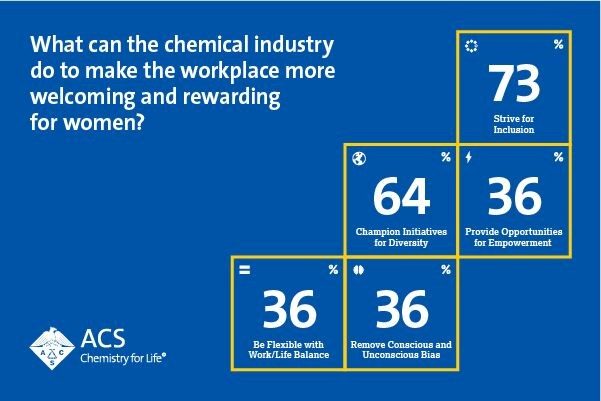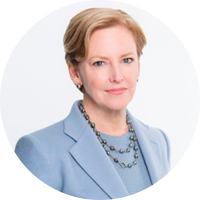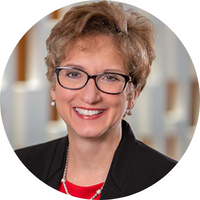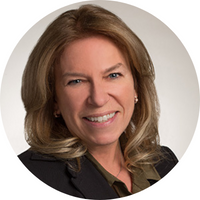
We asked 11 chemical enterprise executives... What can the chemical industry do to make the workplace more welcoming and rewarding for women?
Here is what they said:
- 73% Strive for Inclusion
- 64% Champion Initiatives for Diversity
- 36% Provide Opportunities for Empowerment
- 36% Be Flexible with Work/Life Balance
- 36% Remove Conscious and Unconscious Bias
Participating companies: Cabot Corporation, Carbon, Corteva, Dow Chemical Company, DuPont, FMC Corporation, GCP Applied Technologies, Genentech, Pfizer, PPG, and Solvay

Ellen J. Kullman, President & Chief Executive Officer, Carbon
What challenges do women chemists encounter in the workplace that men largely don’t experience? What can the chemical industry do to make the workplace more welcoming and rewarding for women?
I co-chair an organization called Paradigm for Parity, which is a coalition of business leaders dedicated to addressing the leadership gender gap in corporate America. Since its launch in 2016, we’ve grown to include over 100 companies, including Merck, AstraZeneca, and Eastman—all of whom have committed to achieving gender parity in leadership by 2030. This speaks to the long-overdue culture shift toward achieving true workforce quality for women.
While we do see momentum now, what motivates this work for me is that women in the chemical industry and otherwise currently face many of the same challenges I faced as I was building my career initially. I’ve seen and experienced firsthand the challenges women encounter in getting promoted and holding leadership roles. It’s critical for companies to be honest in assessing where gender disparities exist in their leadership and throughout their organizations. Companies that don’t pay attention to this lose in the long run.
If companies take steps to think through diversity at every level, we’ll make great strides in making sure women are truly represented not only at the executive level, but across the business, giving women more opportunities to grow.

Charlotte Allerton, Head of Medicine Design, Pfizer
What can the pharmaceutical industry do to make the workplace more welcoming and rewarding for women?
The importance of a diverse workforce both in order to represent modern society as well as for enhanced business performance is well understood, and I believe it is the responsibility of all leaders, regardless of gender or ethnicity, to commit to building an inclusive culture. Being respectful of different styles of influencing, leading and approaching scientific problems is an important part of both diversity and inclusiveness. Providing flexible working arrangements to allow colleagues to balance their home and work commitments enables talented individuals to thrive in work every day.
Both my husband and I utilize the flexible working arrangements available through our employers to juggle the careers we enjoy with the needs of our four children who we enjoy even more, so this has been an important enabler for my career.
Building diverse teams and committees serves to inspire colleagues that inclusion is a reality. The role of the pharmaceutical industry in leading by example, investing in different hiring practices, as well as providing advocacy and mentorship for diverse talent, is an important part of this. Within our department at Pfizer, we currently have a deep focus on these practices as well as job rotation and outreach opportunities, to ensure we build a culture where all colleagues can thrive.

Neal Gutterson, Senior Vice President and Chief Technology Officer, Corteva Agriscience™
What can the chemical industry do to make the workplace more welcoming and rewarding for women?
As an industry, we know we need to be more inclusive for women and people of color; full stop. It’s not just a nice to do or the right thing to do, it’s how we’ll deliver the best outcomes for farmers and consumers. To me, it starts with putting more women and people of color in leadership positions. That’s the starting point for creating the more welcoming and rewarding workplace you describe, and it helps inspire others to follow a similar path.
It’s also important that we continue to reach out to youth groups to inspire more young women and people of color to seek education and careers in chemistry. For the past couple of years, I’ve spoken to young people from all over the world whom we support through the World Food Prize. The majority of these young students are female, which is an encouraging trend. Chemistry, by and large, is very diverse. The ag industry in the U.S., however, is not. But again, we can help lead that change.

Nicolas Cudré-Mauroux, Chief Technology Officer, Solvay
What unique challenges do women chemists encounter in industry? What can the women - and the companies that employ - do to mitigate these challenges?
For the second time in my career, I work for an international chemical company led by a female CEO, Ilham Kadri (the previous time was in DuPont with Ellen Kullman as CEO). Both are perfect demonstrations that women have a bright future in our industry. Successful leaders like Ilham and Ellen will inspire all women at all levels to fulfill their dreams.
We all know that getting top talents and having a diverse organization is key to our future.
I do not think that the chemical industry has a really unique challenge in this area since all industries face this issue. In fact, our situation might be better than the one of some other industries because of the higher percentage of women in chemistry vs. other technical areas.
More generally speaking, in the specific case of innovation, diversity, in general and not only diversity in gender, along with inclusion are critical elements to build bridges between areas of expertise and, ultimately, develop unique solutions.

Alexa Dembek, Chief Technology and Sustainability Officer, DuPont
What unique challenges do women scientists encounter in industry? What can the women--and the companies that employ them--do to mitigate the challenges?
I have been deeply inspired by Reshma Saujani, author of Brave, Not Perfect. If there is one message I can share with young women scientists, engineers and researchers it is to embrace your imperfection. So often, women try to overcompensate for gender stereotypes by striving for perfection. I’m a recovering perfectionist myself, and it took me a long time to realize that the pursuit of perfection comes at a cost—not taking enough risks. You can’t change the world by playing it safe, so we need to encourage bold thinking and bold acting to get to better outcomes. We try to encourage a culture for all DuPont employees that rewards bold thinking and risk taking, and I think that particularly resonates with our female scientists.
As an executive, I work with a team on something called my executive platform. Essentially that means – what do I really care about and then how can I go out and champion those issues and use my voice to push for improvement?
Two of the tenets of my platform are STEM education for women and championing diversity and inclusion at all levels of the company. At the end of October, we released our 2030 Sustainability Goals and I am proud to say that one of our goals is to become one of the world’s most inclusive companies, with diversity well ahead of industry benchmarks. And we are getting there – this is all part of modernizing our policies to address modern life. And I’m also proud to say we’ve already acted to implement a new parental leave policy to boost employee satisfaction and fulfillment and do our part to help professional women achieve better work life balance. This one’s very important to me – expect great things from DuPont on this topic.

Jyoti Seth, Vice President of Technology, GCP Applied Technologies
What unique challenges do women chemists encounter in the industry? What can women - and the companies that employ they - do to mitigate these challenges?
Women in general face unique the challenge of work/life balance, taking care of the family while advancing in their career. Many companies now provide resources for advancements with women groups, as well as flexible hours and family leave benefits to name a few. One of the most important things is to have a mentor or coach who can help guide them through ups and downs. Companies should not prejudge, but should offer opportunities to the right candidate, irrespective of gender.

David Bem, Chief Technology Officer & Vice President, Science and Technology, PPG
What challenges do women chemists encounter in the workplace that men largely don’t experience? What can the chemical industry do to make the workplace more welcoming and rewarding for women?
One of PPG’s greatest strengths is the diversity of our people, who represent wide-ranging nationalities, cultures, languages, religions, ethnicities, lifestyles, and professional and educational backgrounds. Their unique perspectives enable us to meet challenges quickly, creatively and effectively, providing a significant competitive advantage in today’s global economy.
Our business and functional leaders set goals related to diversity and monitor progress on a regular basis. In Europe, for example, we have a focused initiative to hire, develop and retain female talent. Actions taken in 2018 included ensuring there is a focus on females when hiring, having women make up 50 percent of the candidate slate for promotions and conducting an equal pay review.
In 2018, 20% of PPG’s top management positions were held by women, with a steady increase in female representation of total workforce. However, women comprise manufacturing's largest pool of untapped talent. To fill the skills gap, we need to empower women to explore manufacturing, from the plant floor to the boardroom, from engineering and R&D to the trades, for a successful career in manufacturing.

Patricia Hubbard, Senior Vice President and Chief Technology Officer, Cabot Corporation
What challenges do women chemists encounter in the workplace that men largely don’t experience? What can the chemical industry do to make the workplace more welcoming and rewarding for women?
I think that the unique challenges that women chemists encounter have less to do with the work itself and more to do with the work environment and balancing work with the needs or wants in one’s personal life.
There are a couple of specific stories from my career that come to mind:
I was in a global R&D leadership role when my sons were born and I was feeling guilty about not spending enough time with them. My male colleague wanted to have a global call regularly at 8 p.m., and I asked if it could be adjusted to 9 p.m. so that I could give my kids a bath first and get on the call when they went to bed. That request was not only denied, but I felt it branded me as not being focused on my career.
Later in my career, I was offsite at a strategy session, which finished at lunchtime on a Friday. Because it was a beautiful Summer day in Cleveland, that was followed by a round of golf – a round to which I wasn’t invited. My boss invited my male colleagues but didn’t invite me.
These examples weren’t intentional acts of discrimination or even exclusion, but each one made me wonder if I belonged. Thankfully, I have been fortunate to work for managers (who all happen to be men) who have supported my choices, and the positive interactions far outweighed these few instances that made me wonder if I was on the right road.
Prejudice of any kind is detrimental to the success of any organization. As leaders, we must work to acknowledge and prevent unconscious bias, and be mindful of the impact of our words and actions. In doing so, we can build an inclusive environment where everyone feels a sense of belonging. We need to be careful not to assume, but always to ask. We shouldn’t assume that the new mother – or new father – doesn’t want to travel. Nor should we assume that because someone doesn’t have children that they can have a call at any time of day or night. These challenges aren’t specific to women, and much of the efforts around diversity and inclusion have opened up conversations about balance in a healthy way.

Kathy Shelton, Vice President & Chief Technology Officer, FMC Corporation
What challenges do women chemists encounter in the workplace that men largely don’t experience? What can the chemical industry do to make the workplace more welcoming and rewarding for women?
A challenge I often hear women share is about making choices in their career. They’re asking questions like: “How do I know when to try something new versus sticking to my area of expertise?” “What roles are out there that I might want to try?” I think many women have these questions and we should be talking to them about what they want and what they hope to achieve earlier in their careers. We need to engage them around every aspect of their lives, not just the next career progression, and helping them make choices that lead to a fulfilling life both in and outside of the workplace.
Why aren’t more women occupying senior leadership positions in the chemical industry (such as the one you hold)?
I am fortunate to have had strong supporters at work as well as a family that encouraged and gave me the freedom to build the career I have today. A few times, it was my manager who made the difference in supporting my progression and giving me the confidence that I could succeed at the next level. I am very grateful to those managers and without them I would not have achieved my current role.
My hope is that more women will see that they are capable of senior leadership roles and garner the support from all parts of their lives to pursue their ambitions.

Andrew N. Liveris, Former Chairman and Chief Executive Officer, Dow Chemical Company
In the chemical industry, it’s not uncommon for young women entering the workforce to encounter mid-career men in their organizations who don’t always demonstrate appropriate openness or respect for what these women bring to the table. What advice do you have for these women? And what advice do you have for the organizations that employ them?
Find a safe harbor in the organization, someone you can talk to and give you advice. Then solicit the support of that person as you push back. Weed out these passive aggressive behaviors by strength and resilience.
For the organizations, short circuit the layers by having listening sessions with your early career women. Senior levels “get it”... it’s the middle of organizations that need to be fixed to rid yourselves of this unconscious or conscious bias.

Wendy Young, Senior Vice President of Small Molecule Drug Discovery, Genentech
Female chemists face unique challenges in the workplace. What have you seen (at Genentech or elsewhere) that mitigates this situation?
Building a culture of inclusion starts at the top. I truly believe that Genentech has developed, and continues to nurture, an inclusive culture and that our leadership values all of its scientists regardless of gender, race, ethnicity, or background.
I don’t deny that at times during my career, it has felt awkward being the only female in the room. But I appreciate that Genentech has spent more than a decade deliberately focusing on ways to develop women and to ensure that they have access to the kinds of opportunities, roles, and responsibilities to contribute at the highest levels.
Specifically, we’ve increased our efforts to recruit more women, and to develop them for broader responsibilities and leadership positions. We’re also working with hiring managers to be cognizant of unconscious bias and to ensure that hiring decisions are based on true competencies. And we’ve created several internal groups aimed at evolving company practices to better support women in the workplace: Genentech Women Professionals, Genentech Women’s Officer Group, and Genentech Women in Science and Engineering (gWISE). gWISE is specifically devoted to identifying and addressing the unique challenges that women in R&D, including chemists, face.
Over the past decade, we have more than doubled the number of female officers (VP-level and above) at Genentech from 15% to 40%. In this time, we’ve also brought 14 innovative new medicines to patients. Our continued focus on diversity of all types has been critical to these scientific advances.
When it comes to inclusion, I believe a company truly needs to walk the walk, not just talk the talk—and that the most important step a company can take is to ensure that different perspectives are part of the conversation and people from all backgrounds feel valued.
Copyright 2020 American Chemical Society (All Rights Reserved)





